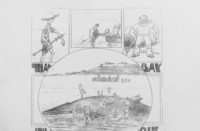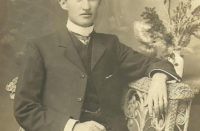Dances, Crossroads, Hexen and Healers – ‘Gott ist gute, but the divil’s not too bad either’!
‘In a storm, you know why they covered mirrors? Because if you looked in a mirror during a storm quite often you could see the devil, that’s what my grandmother said, so you covered it up. During a storm she used to say, “God’s good, but the devil’s not too bad.” They had a fairly healthy respect for the devil.’
(Les Moreland, Kenilworth)
‘Yes, you always covered mirrors; if anyone died you always turned the mirrors around. You see their soul had to go through a window, always an open window to let your soul come in and out. If you had a mirror facing they mistook that for a window and that could damage the soul if they hit the mirror.’
(from Les Moreland, Kenilworth)
‘Then there was the “Hexenschutze”. If a farmer got a bad back, or a muscular injury from heavy farm labouring it could be said that he had been shot by a Hexen (i.e. shot by a witch). This phrase is still a common one amongst older folk in the Fassifern Valley’.
‘My grandmother used to tell the story about the girl who wanted to go to the dance and her parents wouldn’t let her, and she said, “Well I’m going to that dance even if I’ve got to dance with the devil himself!”. And so she did go to that dance. And she noticed this good looking fellow kept looking at her all night, he seemed interested in her a bit, and he came and asked her for a dance and when she was dancing around she looked down and instead of having feet he had cloven hooves. That was to stop us going to dances. We learnt all these things you know from our grandparents.’
(from Les Moreland, Kenilworth)
‘I know I remember one of mum’s cousins, old Alf Neumann, telling me that he was trying to plough at Plainland – “Pleenlandt” they used to call it – “I tried und tried und I could not get that horse to go! And I wondered why and I looked up and dere on d’ udder side of the hill dere vas old Mrs Rosener sitting dere, just looking at me.” And he said, “Den I knew I couldn’t plough, because she had put a hex on me.” He could not get dat horse to go.’
His sister Hedwig, she was telling me one time that she was going to Ipswich on the train. And she was late, and said that she raced down to the train and jumped into the carriage and who should be sitting in the same compartment as her – old Mrs Rosener. And she said, “I didn’t know what to do!”. And she said she looked down and she said, “In my hurry to get away I put my blouse on inside out and den I knew efferyting vas all right und she couldn’t hurt me!”
(from Les Moreland, Kenilworth)
‘Crossroads – if you get to the crossroads you were right. The hexens can’t hurt you. Because that happened to Uncle Fred Niemann when he was coming home from Laidley one night. And all of a sudden this bloke was walking beside him – he didn’t know who he was. He didn’t dare speak to him or anything and he kept walking until he came to the crossroads up near the road that goes off from Plainland and when he crossed the crossroads the fella disappeared. You know who that was, don’t you?’
(from Les Moreland, Kenilworth)
Another old ‘German legend’ concerning the Plainland district was told to me by Christie Zillmann of Imbil: ‘We were all told about this girl, this girl down at Plainland. She was a ‘bit loose’, my grandmother said about her morals. This night these fellows dared her that she wasn’t game to go down to the Plainland cemetery at Midnight and hammer a stake into a certain grave. So she said, being the girl that she was, she did. So she went down and hammered a stake into the grave and when she got up something had got hold of her (unbeknown to her she hammered down the hem of her dress). She must have really thought the devil had hold of her – and just on midnight it seems she died of a heart attack!’ She was subsequently then buried in that very Plainland Lutheran cemetery!
Plainland Lutheran cemetery




I enjoyed reading the stories Les Moreland has written. I have a copy of a letter Les wrote concerning my Great Grandfather and GG Grandmother Paul Guillaume Hermann Guilletmot and ~Anna Carolina Guilletmot nee Grondahl. They lived in Ipswich at some stage in the late 1800’s and early 1900’s. I wonder if anyone can help me with further information that Les may have had on my family history of the above persons. Thank you. Mrs Karen Beyer
Further research and I have found that Paul Hermann Guillaume Guilletmot leased the Union Hotel in Ipswich for the year of 1897-1898.
Correction of order of names. Further research and I have found that Paul Guillaume Hermann Guilletmot leased the Union Hotel in Ipswich for the year of 1897-1898.
I too love reading these old German stories. Many very amusing tales were told to me by my late Father Clarence Maroske who was born and is buried in “Pleenlandt” Thank you for sharing your wonderful knowledge on this site. Kind regards, Helen